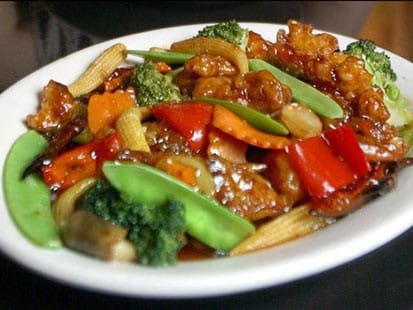“The way to a man’s heart is through his stomach.” It’s a phrase commonly known today. But I never realized how significant food was to my heart – a woman’s heart – until last year.
“Did you eat yet?” – I grew up hearing this greeting from almost every Chinese adult I encountered. The traditional greeting comes from people surviving difficult periods of poverty in China, when food of any kind was scarce. It became a habit of asking each other if someone had eaten yet as a phrase of endearment. You asked, hoping your friend had eaten already, and if they hadn’t, you’d offer what you could. Today, it’s just a greeting, but signifies how you care about the person. There’s a popular t-shirt I once saw that said, “‘Did you eat’ means ‘I love you.’”
At college, dorm food wasn’t bad necessarily, but it certainly wasn’t a good home-cooked meal. Growing up in a Cantonese household meant food was almost always cooked – rarely cereal, muffins, sandwiches, any of that sort. Most of the Cantonese steam their food, which is far healthier than frying or grilling. So having a salad for dinner was actually really new for me in college. I had no qualms with the dorm food, and in fact for a while being able to eat American food all the time was fun. That being said, I started sincerely missing the food I grew up with. Much to my delight, some generous family friends who live in the same city as I do offered to cook and deliver food to me now and again. It was heavenly! Eating pork chops, rice, actually seasoned vegetables!
But not everyone shared my opinion. Soon my roommates began commenting on how my room smelled “fishy” because of the home-cooked food. I felt embarrassed by the “weird” food I loved.
Why is food so important? What we eat makes us who we are, in my opinion. It’s the decision to put something into our bodies, for nourishment or for pleasure. It’s a health and lifestyle choice. Our tastes define us: who we were, who we are, and who we’re going to be. By the “who we were,” I refer to how our eating habits are, for the most part, built by what we consumed growing up. “Who we are” and “who we’re going to be” is contingent on our willingness to step out of our comfort zones. You never really know if you like or dislike something until you try it. Maybe you’ll even fall in love with something new.
The way to my heart is through my food. I didn’t realize it until college, but food represents my culture and who I am. One of the reasons I fell for my current boyfriend was his response to my food and to the food I love. I once asked if he thought the food Chinese people eat is strange, and his response was that Westerners have come up with way more gross foods. It’s strange, but his consumption of the food I love and grew up with makes me feel accepted. After all, food is such a vital part of human life and Chinese culture. So I often ask him, “Did you eat yet?”
俗话说的好,“想要抓住男人心就要先征服他的胃”。 然而作为一个女人,我从未意识到食物对于我自己的巨大影响力,直到去年。
“你吃了吗?” 从小到大一直都能听到身边的大人在说这句话。这种传统的打招呼方式其实兴起于那些挨过了中国饥荒时期的人们之中,因为在那时食物对他们来说是很稀缺的。慢慢地,询问彼此有没有吃饭就变成了他们之间互相关怀的一种方式。如果你的朋友被问时说没有吃,那么你就会尽力去提供你有的。今天,这句话虽然已经变成了一种普通的问候,但却也蕴含着你对这个人的关心。我在一件T-shirt上看过这样一句话:“你吃了吗”就是“我爱你”。
上大学的时候,宿舍的食物并没有那么糟,但也实在没有家里做的饭菜好吃。从小在广东家庭里长大的我,习惯了吃各种烹调好的食物,所以像麦片,蛋糕或三明治那样的东西很少吃。大多数的广东人都喜欢蒸食,这就远比油炸和烧烤来得健康得多。所以,刚入大学时,晚餐吃沙拉对我来讲是很新鲜的。我起初对于吃宿舍的食物并没有什么意见,反而有一段时间觉得每顿都吃“美国”饭也挺有趣的。但即使如此,我却发现自己渐渐地开始怀念起家乡的味道了。让我欣喜的是,一些当时和我住在一个城市的同乡们会做好饭菜定期送给我。吃着排骨,米饭和经过调味的蔬菜,对我而言简直是天堂啊!
但似乎不是每个人都认同我对食物的品味。很快地,我的室友们就开始抱怨我的房间因为这些家乡菜而带来的一股“鱼腥”味儿。我于是觉得有些尴尬,羞愧于自己对这种“奇怪”食物的喜爱。
食物为什么如此重要?在我看来,我们吃什么决定着我们是什么样的人。出于营养的考量或口腹之欲,我们决定将某种东西放入自己的身体,这是一种对健康和生活方式的选择。我们对食物的品味诠释着我们的过去,现在和将来。在这里,我们的“过去”指的是我们在成长过程中所养成的饮食习惯;我们的“现在”和“将来”指的是我们是否愿意大胆去尝试没有吃过的东西,无论喜欢与否。也许你就会爱上某种新鲜的味道。
抓住我心的方法也是通过食物。这也是我直到上大学时才意识到的。食物代表了我的文化,也代表了我是谁。其实我选择现任男友的原因之一就是他接受我热爱的食物的方式。我曾经问过他是否觉得中国人吃的都很怪,他回答说其实西方人吃的东西里有更多更恶心的。虽然奇怪,但他对于我成长过程中所热爱的食物的勇敢尝试让我觉得自己也被接受。毕竟食物是人类生活中不可或缺的组成部分,也是中华文化的精髓。所以现在我就经常问他:“你吃了吗?”


